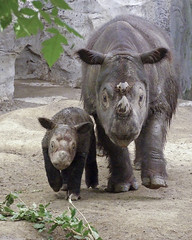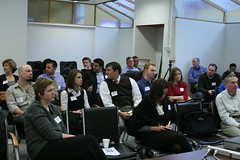A farm and a zoo
 Have you ever visited a farm? A farm which produces milk, or meat, or even wheat, or corn? If you've been there, I'm sure, you've seen many interesting things all over the place: tools and mechanisms, people and animals. I'm also equally sure, you haven't seen there one thing - variety. Meat farms do not breed cows, pigs, chicken and rabbits. Milk farms do not feature cows together with goats on their premises. Grain farms do not harvest dozens of kind of grain. Instead they specialize in something and they try to stay as uniform as possible with respect to animals they grow, grains they seed and tools they use.
Why do they do that? Because variety inevitably means higher costs of operation, but farms can not benefit from variety. For them it makes a lot more sense to have 200 cows of the same kind, than 100 of one and 100 of another since they require different treatment thus rising the cost of support.
Have you ever visited a farm? A farm which produces milk, or meat, or even wheat, or corn? If you've been there, I'm sure, you've seen many interesting things all over the place: tools and mechanisms, people and animals. I'm also equally sure, you haven't seen there one thing - variety. Meat farms do not breed cows, pigs, chicken and rabbits. Milk farms do not feature cows together with goats on their premises. Grain farms do not harvest dozens of kind of grain. Instead they specialize in something and they try to stay as uniform as possible with respect to animals they grow, grains they seed and tools they use.
Why do they do that? Because variety inevitably means higher costs of operation, but farms can not benefit from variety. For them it makes a lot more sense to have 200 cows of the same kind, than 100 of one and 100 of another since they require different treatment thus rising the cost of support.
 On the other hand there are enterprises, which directly benefit from variety - zoos! The more different species you have in the zoo, the more money you can charge for entry tickets, the more visitors you can attract. Yes, operational costs go up as you add more animals - obviously lion requires completely different conditions than pelican, and most likely you will need two different people with different skill sets to look after them. But since you are able to directly sell this variety to customers, it does not undermine your profits.
On the other hand there are enterprises, which directly benefit from variety - zoos! The more different species you have in the zoo, the more money you can charge for entry tickets, the more visitors you can attract. Yes, operational costs go up as you add more animals - obviously lion requires completely different conditions than pelican, and most likely you will need two different people with different skill sets to look after them. But since you are able to directly sell this variety to customers, it does not undermine your profits.
So, the difference between a farm and a zoo is in their relation to variety: it kills the farm, but propels the zoo.
We see examples of both in our day-to-day lives. We enter farm land, when we rent a car, call a taxi, use corporate computer, eat in McDonald's. We go to zoo, when we shop in the mall, eat in the restaurant, buy a vacation tour.
Look at you business, department, or team and see what you are running - a zoo or a farm. Chances are that you are running a zoo, when you should be running a farm. Run a farm unless you really know how to benefit from variety, which zoo has to offer.
Getting feedback from users
When you work as a Business Analyst, important part you job is to conduct software demos and software reviews with users. User reviews can help a lot to improve quality of your product, but you need to put some effort to ensure efficiency of reviews. Here some some hints on that will help.
 First and foremost, you go on those review session to hear users' feedback, positive and negative. You want to make users tell you what they like, what functions seem to be overly complex, where performance is not up to par. You do not conduct reviews to impress users, to have them breathlessly admire features you demo. You have to come to those reviews with the only desire to hear your users and make your software even better for them.
First and foremost, you go on those review session to hear users' feedback, positive and negative. You want to make users tell you what they like, what functions seem to be overly complex, where performance is not up to par. You do not conduct reviews to impress users, to have them breathlessly admire features you demo. You have to come to those reviews with the only desire to hear your users and make your software even better for them.
Be prepared to hear negative feedback and do not try to defend the approach you took to implement certain feature, when users say they do not like it. If you try to defend people will immediately feel that they are wasting time with you, because you do not care about their feedback and insist on you solution, when they call it wrong. Instead, you want to understand, why they think it is a bad approach, and then propose a solution to that. Audience will appreciate your care.
Make sure that your own feedback and comments were addressed before you show anything to users. Nothing can be more frustrating on the review than hearing something that you already know. At least you need to make sure that review participants are aware that certain areas of the product you review fall out of scope of today's session and they should not pay any significant attention to any gaps there.
Keep audience engaged during the entire review session. When someone makes a couple of comments, he feels like his mission here was accomplished and, as a result, will be less attentive, less willing to interrupt anybody to propose idea. You want to keep everyone in the game, and some tricks from presenter's toolbox can help you with that.
